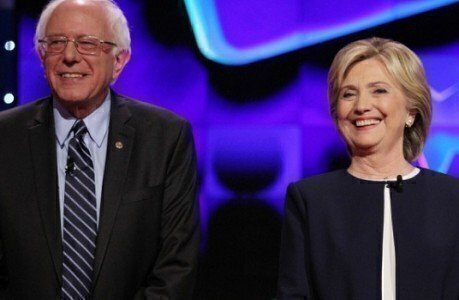
The National Constitution Center looks at the numbers for the March 1 Super Tuesday primary for the Democratic Party, which differs from the GOP because of the influence of Super Delegates.Both parties will have primary, caucus and presidential preference polls on the same day on March 1. For the Democrats, about 22 percent of all convention delegates are selected for the national convention on Super Tuesday, with 11 states, American Samoa and overseas delegates in play.
Unlike the Republicans, who use a combination of winner-take-all, winner-take-some and proportional voting to pick delegates, the Democrats stick to proportional votes as the main way of selecting delegates. But the Democrats also have more Super Delegates than the GOP; these are party officials who aren’t committed to a candidate by a popular vote.
At the Democratic Convention in Philadelphia, 15 percent of the delegates will be unpledged Super Delegates, compared with just 4 percent at the GOP convention in Cleveland.
And on Super Tuesday, about 15 percent of the delegates at stake in those 13 Democratic primaries and caucuses won’t be selected that day because they are Super Delegates. Of the 1,034 delegates coming from the Super Tuesday race states, 878 are traditional delegates picked by voters that day and 156 Super Delegates are excluded from voter selection.
All Democratic primaries and caucuses use the proportional voting system, and they require a candidate get 15 percent of the vote to qualify for delegates. Given the current polling numbers for Hillary Clinton and Bernie Sanders, both candidates would qualify to get all their elected delegates.
In addition to the Super Delegate factor, many Democratic primaries and caucuses are open, allowing a registered voter to request a primary ballot for one party, or to show up at any caucus. Texas is an important exception with its 222 elected delegates. Massachusetts, the second-biggest Super Tuesday state for the Democrats, allows independents to vote in the Democratic primary, but not Republicans.
But as competitive as the race for elected delegates will be on March 1, expect a lot of talk on election night to focus on the Super Delegates, and how they may indicate their voting preferences before July.
Typical Super Delegates include party leaders, members of Congress, Governors, and Democratic National Committee members. In Massachusetts, 22 percent of all delegates are Super Delegates, including nine members of Congress and three senior party leaders.
After Super Tuesday, the Democrats will have their next big test on March 15, when Florida, Ohio, Illinois. Missouri and North Carolina vote, with another 792 delegates in play. By March 16, nearly half of the Democratic elected delegates will be have been chosen.
Democratic Super Tuesday States
| Total Delegates | Pledged | Unpledged | Who Can Vote | ||
| Alabama | 60 | 53 | 7 | Anyone | |
| American Samoa | 10 | 6 | 4 | Open Caucus | |
| Arkansas | 37 | 32 | 5 | Anyone | |
| Colorado | 79 | 66 | 13 | Democrats | |
| Democrats Abroad | 17 | 13 | 4 | Open Caucus | |
| Georgia | 117 | 102 | 15 | Anyone | |
| Massachusetts | 116 | 91 | 25 | Dem./Independents | |
| Minnesota | 93 | 77 | 16 | Open Caucus | |
| Oklahoma | 42 | 38 | 4 | Democrats | |
| Tennessee | 76 | 67 | 9 | Anyone | |
| Texas | 252 | 222 | 30 | Democrats | |
| Vermont | 26 | 16 | 10 | Anyone | |
| Virginia | 109 | 95 | 14 | Anyone | |






